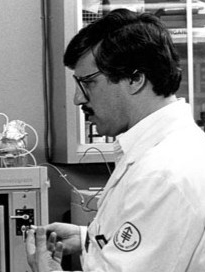| Abstract: |
OKT3 monoclonal antibody (mab) recognizes a membrane antigen asociated with the T cell antigen recognition receptor, and is known to be mitogenic and to induce lymphokine production. Our studies demonstrate the ability of OKT3 mab to induce from cultures of human T lymphocytes supplemented with adherent cells the production of colony-stimulating factor(s) for granulocytes and macrophages (GM-CSF) and interferon-γ (IFN-γ), an inhibitor of clonal growth of hematopoietic progenitor cells. As has been shown for the mitogenic and IFN-γ-inducing activity of OKT3 mab, the induction of GM-CSF release in cultures of T cells is strictly dependent on the presence of adherent cells. However, the concentrations of OKT3 mab required for optimal GM-CSF production (50 ng/ml) were found to be 80-fold higher than those sufficient for maximal IFN-γ production, proliferation, and interleukin 2 production. IFN-γ activity induced by OKT3 mab partially inhibited colony and cluster formation from progenitor cells of granulocytes and macrophages in vitro. Therefore, neutralization of the IFN-γ by monoclonal anti-human-IFN-γ antibody before assay of conditioned medium in bone marrow cultures significantly enhanced the detection of GM-CSF production in response to optimal OKT3 mab concentrations on days 4 through 6 in cultures of T cells supplemented with 15% adherent cells. Highly enriched OKT4+ and OKT8+ T cell subsets co-cultured with adherent cells in the presence of OKT3 mab both produced GM-CSF and IFN-γ and showed similar dose-response curves to OKT3 mab. The requirement for the presence of adherent cells could not be overcome by the addition of purified interleukin 1 or macrophage supernatants. Studies using irreversible inhibitors of DNA (mitomycin C) or protein biosynthesis (emetine-HC1) revealed the necessity of intact DNA synthesis and translation in mononuclear cells to produce GM-CSF in response to OKT3 mab. Loss of GM-CSF production was observed when either adherent cells or T lymphocytes were treated with emetine before co-culture with untreated cells of the other population in the presence of OKT3 mab. In contrast, mitomycin C reduced GM-CSF production significantly when T cells, but not adherent cells, were pretreated. These results suggest that T lymphocytes and adherent cells closely cooperate in the production of GM-CSF induced by OKT3 mab. |




